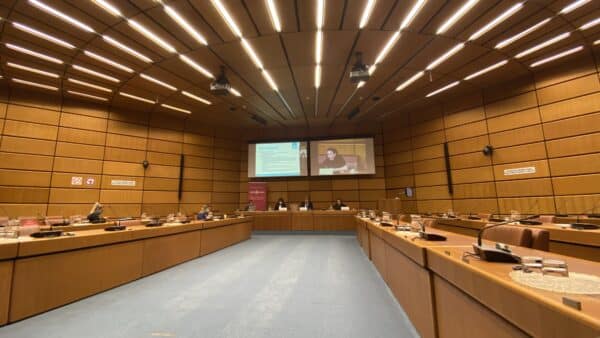30 September 2021 –
Grand corruption accounts for billions of dollars of public money being stolen every year and hinders the sustainable development of entire countries. What then can be done to tackle this seriously aggravated form of corruption? This question was debated by a panel of five civil society experts during a side event organized by the UNCAC Coalition and Transparency International on the margins of the resumed 12th session of the Implementation Review Group (IRG) in Vienna. Co-sponsored by Norway and moderated by the UNCAC Coalition’s Managing Director Mathias Huter, the event was attended by over 50 delegates, governmental experts, and civil society representatives.
Ambassador Kjersti Ertresvaag Andersen, the Norwegian representative to the United Nations in Vienna, opened the session by highlighting Norway’s engagement in the fight against Grand Corruption, including CoSP Resolution 7/2, initiated by Norway and Peru, as was well as the Oslo Statement on Corruption Involving Vast Quantities of Assets. Recognizing the transnational nature of grand corruption, the ambassador emphasized the need for technical, legal, institutional and operational countermeasures at the national and international level.
This was echoed by Gillian Dell from Transparency International, who stressed that greater international cooperation is needed to prevent, prosecute and remedy grand corruption and the vast harms it causes. To this end, Transparency International has developed the following definition of grand corruption that could be used for prevention and enforcement actions:
“Grand corruption means the commission of any of the offences in UNCAC Articles 15 – 25 as part of a scheme that
1) involves a high level public official; and
2) results in or is intended to result in a gross misappropriation of public funds or resources, or gross violations of the human rights of a substantial part of the population or of a vulnerable group”
Ms. Dell further stated that on the national level, States Parties should adopt measures to criminalize and prosecute Grand Corruption based on universal jurisdiction and allow for private prosecutions by designated public interest representatives. Internationally, States Parties should aim to implement paragraph 18 of the UNGASS Political Declaration, which aims to “enhance inter-agency cooperation at all levels to prevent individuals and companies, {…} and systems used to transfer money, as well as non-regulated or unregistered financial or commercial or non-commercial entities at serious risk of being abused for corruption and money-laundering, from committing or being used to facilitate acts of corruption {…}.”

In this regard, Emile van der Does de Willebois, Coordinator of the Stolen Asset Recovery Initiative, pointed out that many states are backing away from regulating financial service providers for anti-money laundering (AML) purposes, which poses a huge problem in achieving beneficial ownership transparency and combating grand corruption. StAR will publish a report on this issue in 2022 and will continue to support states in carrying out beneficial ownership risk assessments.
Sharing the specific country experience of Panama, Carlos Barsallo, Executive Director of the local Transparency International chapter, stated that Panama is still included on a FATF list of countries with deficiencies in AML measures, due to a lack of beneficial ownership transparency. Whilst TI Panama will continue advocating for greater beneficial ownership transparency, Mr. Barsallo called for international support for prevention and enforcement work at the national level, as the lack of independence of local institutions remains a key obstacle in the fight against corruption.
Similarly, Karim Daher, a Lebanese lawyer and tax advisor, and former member of the FACTI Panel stressed that international mechanisms and cooperation are essential to effectively combat grand corruption at the national level. He also urged States Parties to act on the recommendations of the FACTI panel and to set up centralized beneficial ownership registries, strengthen public procurement transparency, criminalize failure to comply with AML obligations and involve journalists and civil society in the UNCAC review mechanism.
Representing Integrity Initiatives International, Justice Richard Goldstone emphasized that the failure to prevent corruption and kleptocracy seldom stems from a lack of laws, but from a lack of implementation. In these cases, appropriate international mechanisms, such as an International Anti-Corruption Court could fill the gaps. As a next step, a draft statute of such a court – which must be consistent with the provisions of the UNCAC and the definition of grand corruption developed by Transparency International – should be developed and circulated among states and CSOs.
In the ensuing open discussion, the panelists engaged with representatives and government experts on the question of how to advance the fight against grand corruption and the “culture of corruption” in the public and private sectors that often seem to enable it. Many speakers highlighted the importance of civil society activism in order to expose corrupt acts and mobilize the public to end impunity and hold their governments accountable. Mathias Huter concluded the session by reaffirming that the UNCAC Coalition and Transparency International stand ready to support State Party delegates in their efforts to combat grand corruption.



